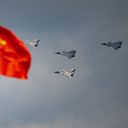China expected to ramp up pressure on Taipei and Washington after Taiwan's election

TAIPEI, Taiwan — China is likely to increase its coercive measures towards Taiwan in an attempt to push both Taipei and Washington to adopt more accommodating positions towards Beijing after the island elected ruling Democratic Progressive Party's William Lai president on Saturday, analysts say.
Why it matters: Growing military and economic pressure on Taiwan could fracture the delicate balance in the tense U.S.-China relationship, sending relations between the two superpowers spiraling and risking stability in the region.
Driving the news: Lai's election marks an unprecedented third term for the DPP, which in the past eight years under President Tsai Ing-wen has seen Taiwan further strengthen its relationship with the U.S. and move to diversify its trade away from China.
- The Chinese government views Lai as a "separatist through and through" and warned Taiwanese voters ahead of the election to not vote for him.
- "Our stance on resolving the Taiwan question and realizing national reunification remains consistent, and our determination is as firm as rock," said China's Taiwan Affairs Office spokesperson Chen Binhua.
- He added Beijing "firmly" opposes "the separatist activities aimed at 'Taiwan independence' as well as foreign interference."
Zoom in: Beijing is expected to pressure Taiwan through a variety of means, analysts told Axios.
- There will likely be an "immediate uptick" in the number of Chinese military incursions into air and sea near to Taiwan to "send the signal, you voted poorly," said Dean Cheng, senior advisor to the China program at the U.S. Institute of Peace.
- Beijing could "conduct some kind of military demonstration around inauguration day to signal their displeasure with the incoming Lai administration," Raymond Kuo, director of the RAND Corporation's Taiwan Policy Initiative, said.
- There could also be "new trade restrictions on Taiwanese companies, and heightened cyberattacks on Taiwanese infrastructure, all of which will pose significant obstacles for the new government," according to Craig Singleton, deputy director of the China program at the Foundation for Defense of Democracies.
Yes, but: The goal of such measures is primarily political, not military, analysts said.
- "[I]t's important to draw a distinction between shows of strength, and conflict," Amanda Hsiao, senior China analyst at International Crisis Group, told Axios.
- "Increase in pressures are meant to be a political signal and they're meant to change the behavior of both the Lai administration and Washington. But it does not portend an invasion," Hsiao said.
"Beijing sees Lai as a troublemaker, someone they can't trust," and someone who may adopt a "more provocative stance" than Tsai, she added. Beijing wants Washington to "help rein Lai in."
- There's precedent for that. The Bush administration urged the first Democratic Progressive Party president Chen Shui-bian, who sought to move Taiwan towards a more formal independence, to exercise more restraint.
Background: The U.S. and China held several high-level meetings in the week leading up to the election. Taiwan came up frequently.
- Blinken met with a veteran Chinese diplomat in Washington on Friday and stressed the importance of stability in the Taiwan Strait.
- The U.S. and Chinese military held defense policy talks in DC. China's Ministry of Defense said in a statement after the talks that China would "never compromise" on Taiwan.
- After Saturday's election, Blinken said the U.S. is "committed to maintaining cross-Strait peace and stability, and the peaceful resolution of differences, free from coercion and pressure."
What to watch: A relatively modest increase in pressure from China could indicate that Beijing, too, is concerned about upsetting U.S.-China ties, and about alienating neighbors in the region — especially as China seeks to bolster regional trade ties to prop up its flagging economy.